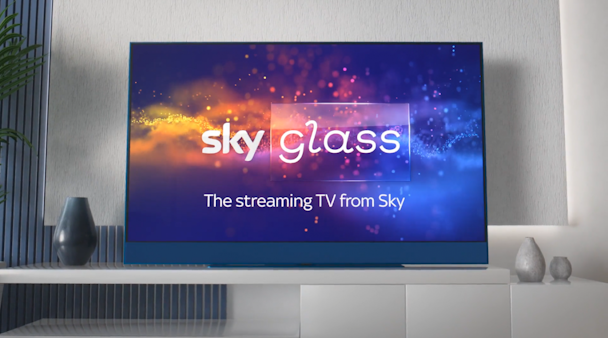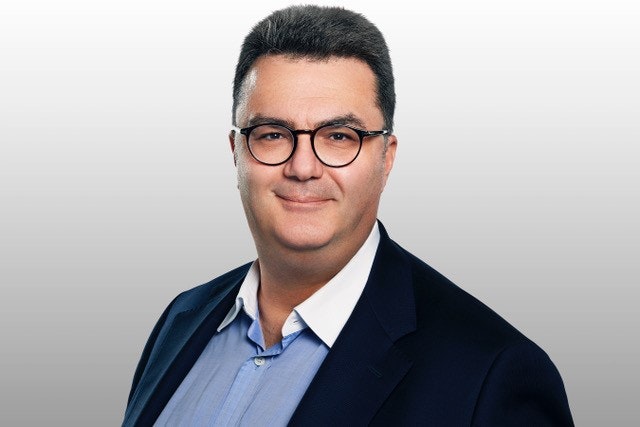Why an in-built TV camera is at heart of Sky’s next big pitch to advertisers & viewers
An in-built 4K smart camera means Sky's new flagship product Sky Glass can watch you as you watch TV. The broadcasting giant's chief business officer Patrick Béhar tells Ian Burrell why this could transform viewing habits and usher in a new era of highly targeted advertising.

Sky Glass contains a 4K smart camera
A social television age is dawning when audiences will be enticed to abandon their passive viewing habits and get up off the couch to strike a yoga pose in front of a TV that corrects their posture or watch a big game with friends who appear virtually at the side of the screen.
Such possibilities are created by putting a 4K smart camera inside a television, which is exactly what Sky will do this year with Sky Glass, its newly-launched streaming TV.
Patrick Béhar, chief business officer for Sky, UK and Europe, recognises that this potential landmark moment for home entertainment can only succeed if viewers embrace the change. “Sky is religious about customer experience,” he says, speaking in Sky Central, the hub of the media giant’s sprawling west London campus.
When news of a camera first emerged last October, tech cynics noted that the idea sounded similar to the now defunct Kinect sensor tried by Microsoft’s Xbox in 2013.
Sky’s strategy for putting cameras in TVs takes into account shifting audience behaviour patterns since the onset of Covid and is based on what Béhar identifies as “four building blocks” of customer activity; communication, games, fitness and communal viewing.
“The big thing we have learned out of the pandemic is communication, the ability to do video calling in a much more relaxed fashion,” he says. Sky has signed a partnership deal with Zoom and hopes that the giant Sky Glass screen, which ranges in size from 43-inch to 65-inch, will come to replace smaller devices as an optimum platform for video calling.
The cameras come with motion controls and gesture support, enabling other possibilities. “The second [building block] is family games, which is very important,” he says. Béhar has been impressed by camera-based trials of the popular game Fruit Ninja, allowing gamers to stand and essay the sword strokes of a Samurai warrior, rather than merely swipe a finger on their phone.
“The third [building block] is fitness,” he says. “The camera is skeleton-tracking, so you can correct your posture.” One key partnership here could be fitness platform Peloton, which has an app on Sky Glass. The final block of the social TV is “watch together”, including “the ability to enjoy a football game” with faraway friends transported to your screen.
For advertisers, the arrival of the TV camera will bring big changes, he predicts. Béhar is the father of two teenagers. “They walk into the room and Glass senses who they are and suddenly switches on relevant advertising to them,” he says. “You (the viewer) can decide yourself what kind of ads you want and what you don’t want to see.”
This has significant implications for food and drink brands. “Think about HFSS (products high in fat, sugar or salt) for instance. This is perfect if you don’t want your kids to see (advertising for products) that are too high in sugar or fat. There’s a lot of stuff you can do.”
He predicts that the presence of a camera in Sky Glass, which also has full Dolby Atmos surround sound, will lead to greater innovation and creativity in ads. “This is not a display ad on the phone or a computer, this is a targeted, high impact, powerful, high-quality resolution, amazing sound, targeted ad.”
Ahead of the launch of the camera this year, Sky’s product and technology teams are “brainstorming quite a bit”, says Béhar. “Obviously you can go very far but we want to be guided by what the customers want, what they need and how they are going to be interacting with Sky Glass. We launched in October, we are getting lots of data and we are looking at that data.”
Sky Glass can help advertising, he says, by eliminating out-dated ads on recorded programmes “so when you watch it two weeks later you are outside of the campaign flight and it’s not relevant”. Shows saved into the Sky Glass “playlist” serve only current ad campaigns. “Suddenly...everything that you have seen becomes targeted and that opens a lot of opportunity for brands to be a lot more precise and a lot more relevant to customers.”

Béhar, who reports to Sky chief executive for UK and Europe, Stephen van Rooyen, arrived at the company three years ago, soon after Comcast outbid Disney in a £30bn acquisition deal. Rupert Murdoch and Fox also lost out in a titanic battle for control of the business he founded. The “Keith Rupert Murdoch Building” nearby is acknowledgement of the mogul’s legacy and the reputation for ambition and innovation he built into the Sky brand.
Yet under new ownership there has been major cultural transformation. When Sky was a jewel of the Murdoch empire its relations with other big media organisations were often strained. It was aggressively competitive towards the BBC, slugged it out with BT over sports rights and bristled at press suggestions that it would be “killed” by Netflix.
The ethos is now different.
“There’s a natural gravity towards more of a symbiotic relationship,” says Béhar of Sky’s new emphasis on partnerships and collaboration. “At the end of the day, given our [subscriber] base we are the best-placed to promote other people’s content.”
Partnerships is one of his three areas of business responsibility, alongside distribution and advertising, across the three territories of the UK, Italy and Germany.
Sky has 23 million customers across Europe, with roughly half of them in the UK. According to Enders Analysis, its partner network means it offers direct access to 99% of the subscription content that its consumers have paid for, from Spotify to Apple TV+.
Of all Sky’s partnerships, the one with Netflix is perhaps most significant. “To do that both of us have had to cross some Rubicons mentally,” says Béhar. In signing the 2018 deal, Sky made a decision “to put Netflix on the platform and really stand behind it”. Sky Glass, where the streamer allows its shows to be positioned in mixed content rails, offers an unbeatable Netflix experience, he claims. “I think it is the most advanced Netflix partnership in the world. In the way that the Netflix product is embedded, promoted, merchandised [and] visible across the platform.”
As an aggregator of content, Sky can be “at the centre of the connectivity and entertainment ecosystems”. Under a partnership with Viacom, the streamer Paramount+ launches on Sky Glass in June. A ten-year deal was recently signed with BT Sport to keep its content on Sky.
Most notably, tensions between Sky and UK public service broadcasters (PSBs) have receded. “We don’t see them as competitors, we really see them as partners in the process, I think there has been a shift,” says Béhar. "They also have changed their mind, I don’t want to speak for them but some of their rhetoric has changed as well."
PSBs “represent a huge proportion of consumption”, he says, praising their performance during the pandemic. “I think they have been indispensable to the whole nation at the time of Covid. I think I can safely say that the relationship is at an all time high with each of them today.”
Asked about current political pressures on the PSBs and their business models, he comes to their defence. “I think that the PSBs are critical for the overall ecosystem. They are critical in terms of viewing, they are critical in terms of funding of the production and creative ecosystems in the UK, and they are also critical in terms of innovation. Let’s not forget that a lot of innovative genres , formats and show still come from them.”
Channel 4 is a partner in Sky’s targeted ad service AdSmart. Sky is also in talks over joining ITV’s ad platform Planet V.
For its social TV cameras it has partnered with Microsoft, a pioneer of this technology.
“Rather than getting a bigger part of a smaller pie we would rather make the pie bigger,” says Béhar. He claims Sky has “contributed to a heightened sense of collaboration and partnership” across the UK TV sector, surpassing that found in other territories. “I think some of that is the pragmatism of the British culture, some of it is the fact that it’s an English language territory…,” he says. “There is a lot of innovation that comes from the UK market.”
In previous times, Sky was often criticised for profiting from British television without creating quality content. But its 27.5-acre Elstree Studios site, with 13 sound stages, will open in the latter half of the year, led by the formidable new Sky Studios CEO Cécile Frot-Coutaz, who like Béhar is originally from France.
He still has a place in Paris. It has a “very nice set up” for home entertainment but it’s no longer sufficient, he says. “I cannot last more than two days, I have got to go back to my Sky Glass environment.” If Sky’s TV camera technology succeeds, he might not stay away even that long.
To read more on what's next for broadcasting check out The Drum's newly launched Future of TV hub
